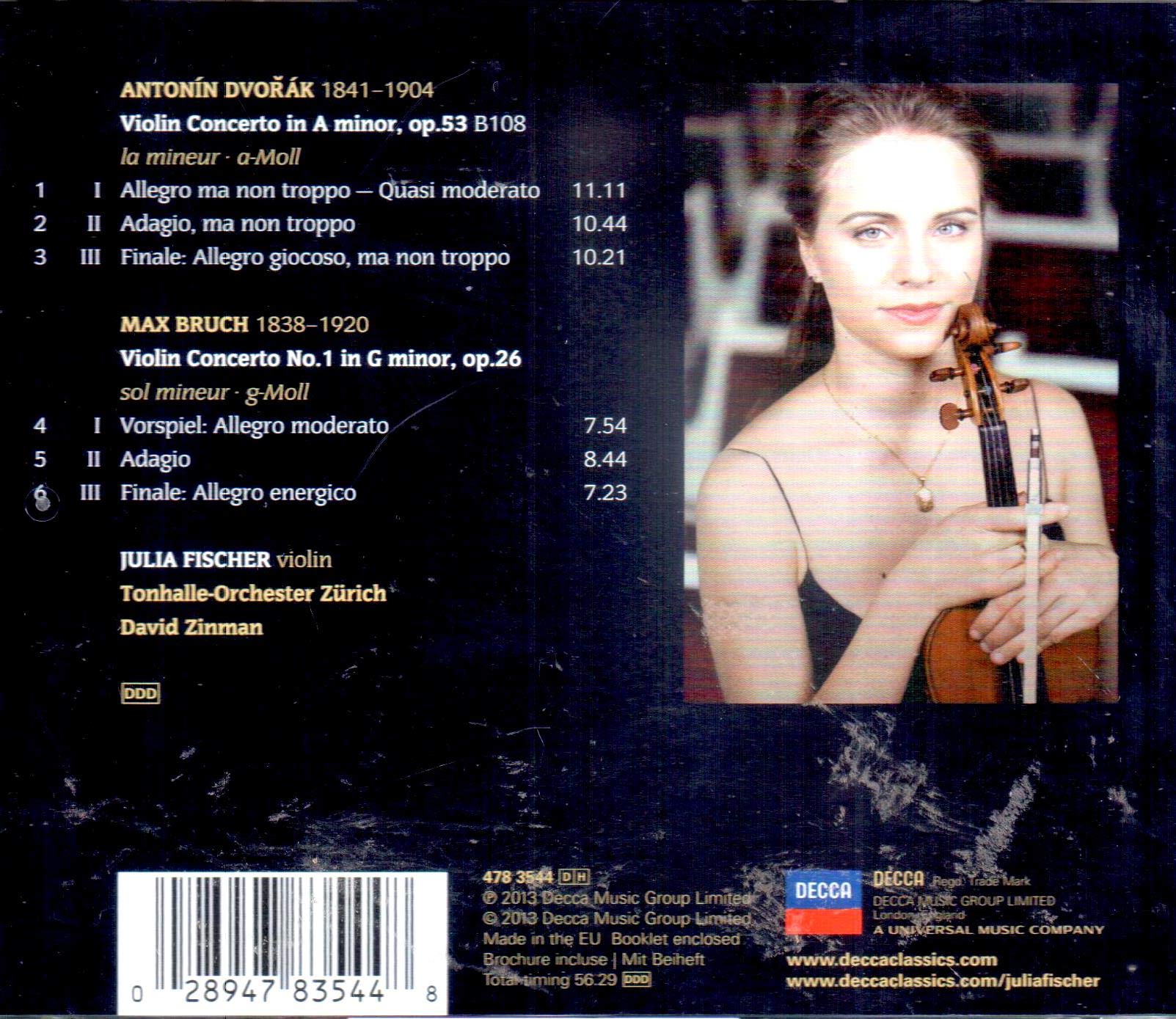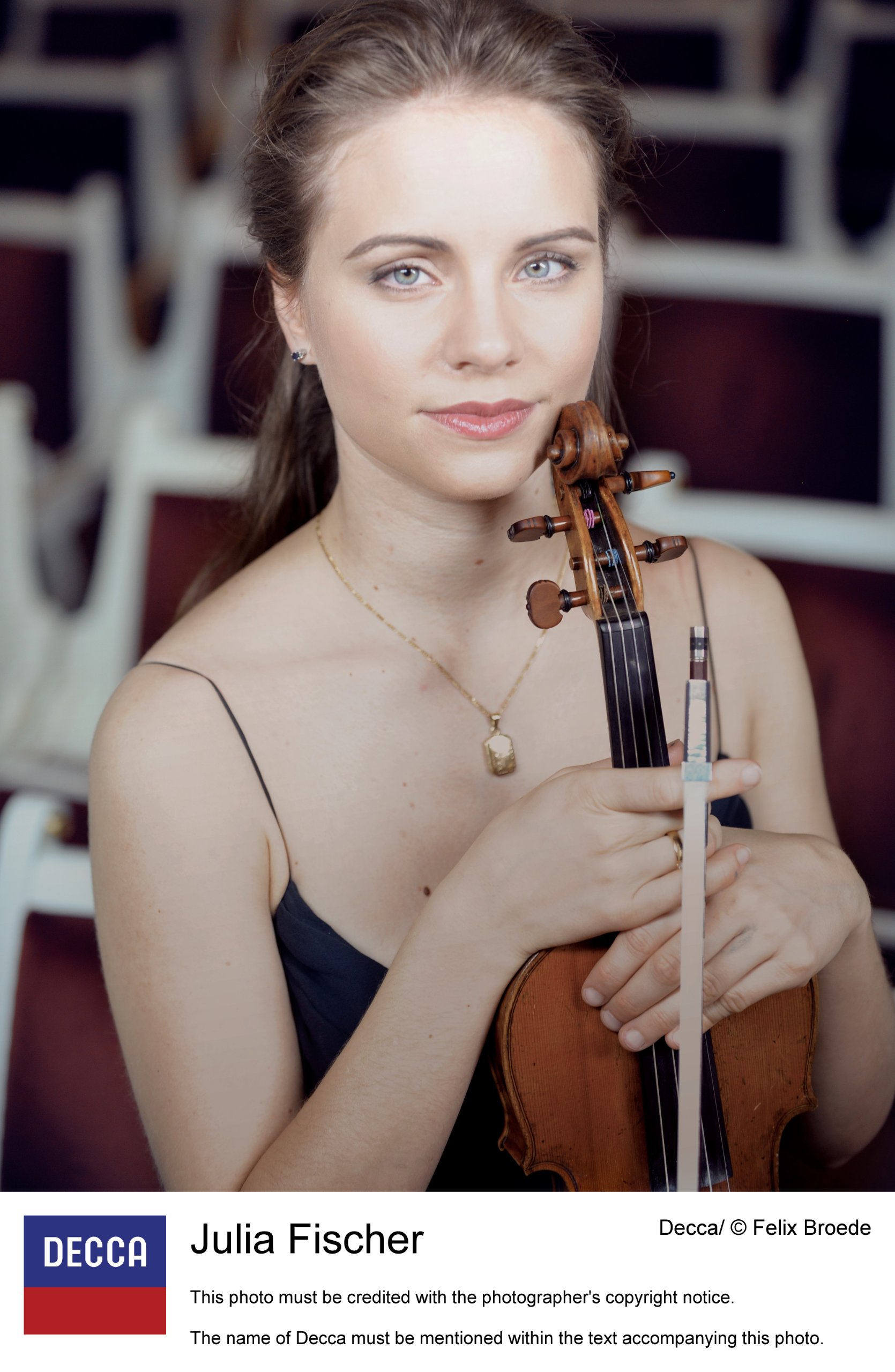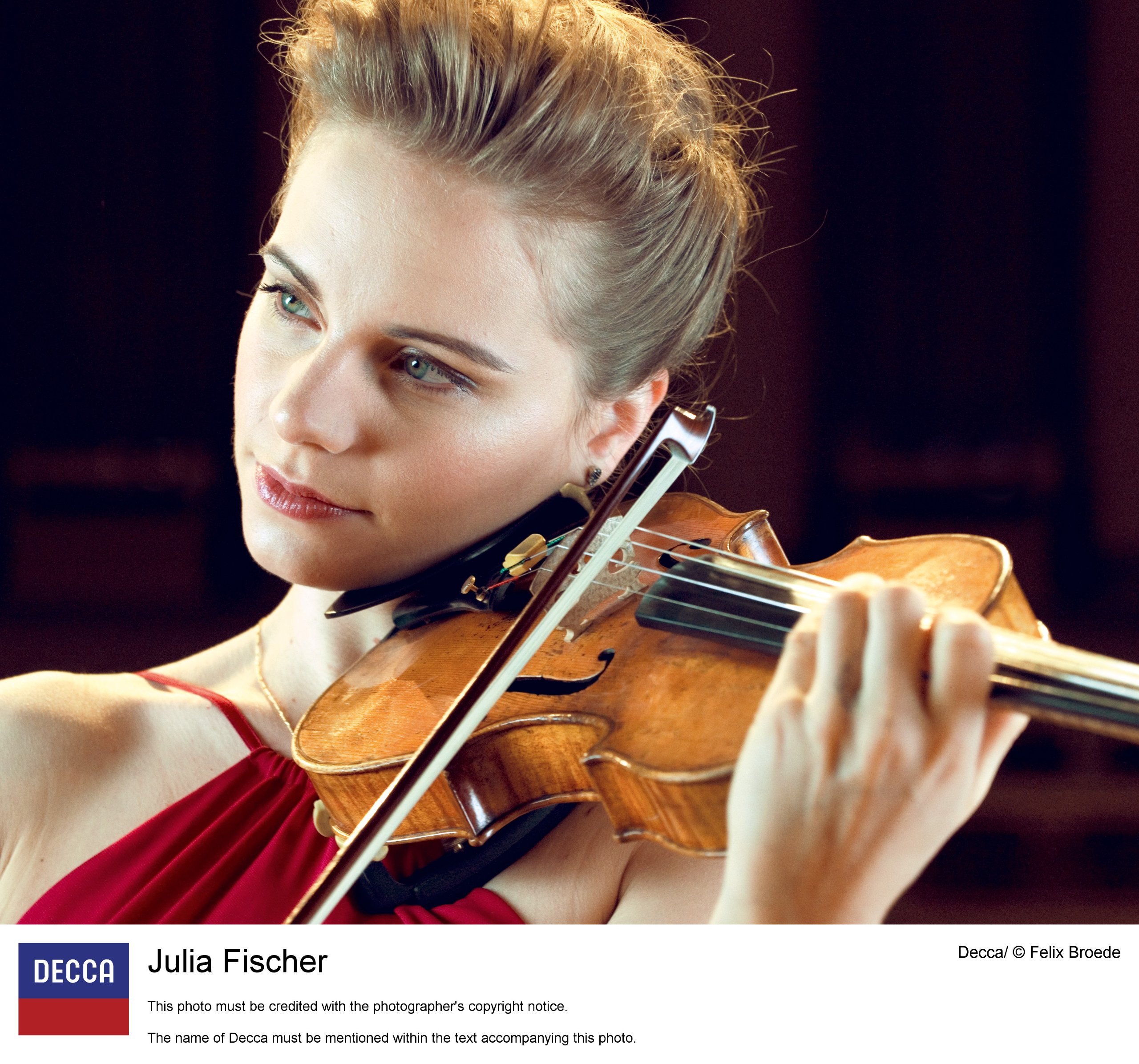Customer Services
Copyright © 2025 Desertcart Holdings Limited
Desert Online General Trading LLC
Warehouse # 7, 4th Street, Umm Ramool, Dubai, 30183, Dubai





Bruch & Dvorak: Violin Concertos
D**E
Julia Fischer brings two war horse concertos .... into compelling musical life? ...
I find myself mostly agreeing with those who commented positively on this Julia Fischer/Zinman/Tonhalle release. Fair disclosure: I am listening to the album streamed via NuForce 5 DAC/AMP with suitable higher end headphones, though neither is an 'ultimate' audiophile set up. As the music comes across, I find little to none of the negatives other people have mentioned. In terms of engineering I hear the soloist as very nicely balanced with the Tonhalle who are playing very well, very sensitively with nuanced detail, under later Music Director David Zinman. I must admit I am already something of a steady fan of soloist JF. All the recorded music I've heard from her so far at least merits a serious listen, often excelling in musicality and intense involvement above all. Similarly, the Tonhalle is coming across well from a sonic angle. Top to bottom frequencies are clear and sound well balanced (at least on headphones .... which incidentally often sound very fine after the NuForce5's excellent PCM or DSD processing. (see Amazon .... the Nuforce 5 DAC/AMP deserves its own review but you know, health problems) So far as sound goes, this release improves into the contemporary era compared to say, another favorite, Josef Suk in a much earlier stereo Czech era recording. So good to better sound as I hear it. Julia is just nearly perfect. Her tone is somehow a blessed glow that reminds me of listening to the hot tone of the famous David Oistrakh, combined with my beloved Henryk Szeryng. Fire and silver, all at once. Her way with a fiddle is also nearly beyond reproach. Hence I suppose, the international career she has had and well merits on both technique and musical terms. I still think I hear enough of the folk-rooted rhythms and melodies to immediately acknowledge Dvorak's beloved Bohemia. Same goes for the Tonhalle with Zinman. Take for instance the folkish sung trio like interlude in the jaunty last movement, everyone brings across the overall folkish textures as well as touching the melody with songfull sweetness that indeed sounds to my ears as beloved remembrance. I also hear the sprung rhythms as sufficiently infused with folk dance-like shapes that nothing is so square as to ask us to forget the composer in all his many-sided gifts. Maybe I should pause her briefly, to remind readers that I have multiple recordings of just about everything so far with notable exceptions. I tend to choose a release from these highly personal shelves, then listen to it repeatedly for a while, savoring .... perhaps cherishing .... those reasons I kept it in the first place. My ears are just my ears. But I do listen on my better available equipment at any given time. That said, let's get to the next concerto The Bruch begins with a sweetly understated orchestra passage, then Julia comes in with a commandingly personal entrance. Zinman and Tonhalle let loose more later. Julia remains very personal, often touching phrases with more assertive drama and narrative which others fire up with larger than life high song. I don't want to push the comparison too hard, but the dramatic narrative touches are not overdone and put Dvorak's writing in a different light .... resulting in a transformative music-making. This reminds me of my first hearing of the Beethoven Violin Concerto as recorded by Jascha Horenstein with a soloist whose names escapes me at this moment, all devoted to musically bringing out the drama of Beethoven's concerto, more often played as a lyrical crowning achievement. Don't exaggerate the comparison, though, as paying attention to Beethoven's sforzando probably has earned a dissertation or two across the ages. When it comes to the larger sweep of Bruch's writing in this concerto, I don't hear anybody holding back all that much, though along with the rising sweep of soloist, orchestra and both I do hear a sense of relaxed elegance .... if that is not a musical oxymoron. Indeed I would suggest that this reading of the Bruch is one of the most elegant yet passionate readings available. My benchmark in all three Bruch concertos has long been James Ehnes with Dutoit leading Montreal (see Amazon). Julia doesn't stint musically, so who really listens to her beautiful music making comparatively? After spinning repeats of this altogether lovely release I will no doubt be sent back to Ehnes in Montreal for a while. Let me respectfully suggest that a good marker of a worthwhile reading will be that it does not wear a listener out after repeat plays, from loving the music at hand. Most of the discs on my fav shelves do have in common, how each calls attention in varied ways to the beauty, power, depth and wise treasure of the music .... the music, the music .... not being played so much as playing itself out to us, ever so generously. Well. Please forgive me if anything riles you up. I've been a lost music nut ever since my farm town adopted parents put an old 78 rpm laquer disc on the imposing victrola that stood in a corner of their living room. Just a couple years older I went to stay with my grandmother, even deeper into the countryside ... then became fascinated with the entirely wood horn acoustics of her family's wind up player. How far the recording arts and sciences have changed! Yet the power of music remains. Thankfully. Remains. Bravo, Dvorak. Bravo Bruch.
M**R
Julia Fischer new
It is easy to slap a "Five Star" to every CD and write a boiler-plate review, but what is the point?Thus if I got everyone to agree with me, then I should stop writing because the reviews will all be the same. However, am I better off by doing that, is there a point to get everyone to agree with me? Do I care?So you can call me names if you do not like my honest review and you can stop reading this trash!.......................................We didn't have Julia Fischer for a while due to her new extended family. We missed her music a lot.Have waited a couple of months for this recording and it was a little disappointing.The Dvorak concerto is beautifully played with a loud orchestra. The last movement is what most listeners are familiar with and is nice.The Bruch's concerto is also a well known concerto, and I can compare Julia's performance with the other greats easily. Being biased towards her, I like the Julia Fischer style better than the rest. This concerto includes a lot of sadness undertone yet with fire. Bruch did not have a rich comfortable life and the frustration is at times expressed through out the concerto.Julia, maybe after her maternal leave, has matured even more. There are more depth and understanding than before. Except these two concertos are not her favorite music though.The orchestra for me is loud but muffled, otherwise fine.I have ALL of Julia's recordings, but if I do not have this one, I won't be missing it.The recording is what I am unhappy about, quite poorly put together, making this CD sounds like it has been recorded forty years ago. I listened to the CD in a home theater audio system environment, and then I also listened to the same CD on a regular two-channel to compare the sound quality, there are no significant difference.Maybe Decca has lost their touch on this one. Decca has been a very careful and consistent recording company. However, Julia is also very pickyaudiophile and care very much about the audio playback. That's why she was one of the first major artists to record with Penta Tone until people who do not have surround sound keep complaining...For all of Ms Julia Fischer's fans out there, please note that I am not implying anything negative about Julia, I am criticizing the recording company.Welcome back Julia!
I**S
A disc of distinction offering warmly Romantic readings of both concertos
This disc, recorded in 2012, offers the same coupling as that made some years earlier by Tasmin Little. Otherwise this is a relatively rare coupling but one that is very attractive.The Dvorak concerto has always been second choice in the trilogy of Dvorák's concertos with the cello concerto being a firm favourite and with the piano concerto being the least popular. The two string concertos benefit considerably by Dvorak's own expertise as an experienced string player. The violin concerto was written at a time when the composer was under the considerable influence of Brahms whom he greatly admired. He had yet to fully formulate his own distinctive style of composition incorporating the Slavonic dance and folk elements that are so integral to his later works. Nevertheless the early signs are still there and can easily be heard in the final movement especially but also in the pointed rhythms of the first movement. As a reference point in these respects, the early 1960's recording by Josef Suk with the Czech P.O. conducted by Karel Ancerl, is by far the most obviously Slavonic in feel. However, that recording even in its new 24 bit remastering, cannot begin to compare with this latest offering by Julia Fischer.Julia Fischer, surprisingly for someone with a Czechoslovakian mother, offers a noticeably less Slavonic inflected reading than Isabelle Faust for instance on her recent alternative recording. This may be partly to do with David Zinman's leadership of the orchestra where the Slavonic rhythms, so pointed under Ancerl's conducting with Suk, are smoothed out quite markedly. This less Slavonic inflected approach is also true when comparing the disc with those by both Sarah Chang and Isabelle Faust. The consequence of this is to bring the concerto more firmly into the realm of the central European Romantic tradition of violin concertos. Thus the concerto becomes far more related to the concertos by Bruch and Brahms for instance. This is not a disadvantage, but is a clear change of emphasis. A further linking factor for all three of those concertos may well be the considerable influence of Joseph Joachim, the virtuoso violinist of the time, who was closely consulted with in terms of each concerto's construction as well as with it's technical aspects. He made alterations and significant suggestions about each concerto which were accepted by all three composers before their concertos were finalised.If one therefore sees the Dvorak concerto as more in the great Romantic concerto tradition of central Europe rather than as an example of Slavonic nationalism, this reading must be considered to be a great success. Julia Fischer has a peerless technique so that all the practical difficulties of the concerto are overcome with apparent ease. The music flows with lyrical intensity and the concerto, seen in this light, takes on a greater depth of Romantic expression and becomes a stronger composition of that period. This is a completely acceptable view as it more clearly fits in with Dvorak's composing style of that time when he was still influenced by Brahms and the Romantic movement rather than his later Slavonic interests.In terms of the Bruch concerto, Julia Fischer offers a deeply thoughtful and satisfying reading on all counts. This concerto is firmly embedded in the Romantic movement of the time and that is what is delivered in this reading. It is worth noting that Julia Fischer's playing of the slow movements of both concertos is outstanding in its melodic nature which makes the most of her tonal purity. Zinman provides an accompaniment to both concertos with his orchestra that completely matches the overall concepts.The sound of the opening of the Dvorak seems curiously muted and lacking in treble response. It was sufficient to make me check that the wiring to the speakers was fully engaged. In this respect I can sympathise with other reviewers who have expressed some dissatisfaction with that aspect of the sound. However, I found that my ears quickly adjusted and once the soloist was fully established that awareness disappeared. It is possible that the lack of top string brightness at the very beginning especially is an interpretive decision and part of the smoothing out of textures and rhythms adopted by the conductor on this occasion. It did not destroy the overall pleasure in the disc.I would suggest that this disc deserves to be considered as one of the best available of these two works. There are other fine performances of both works but not so coupled. Therefore, if this coupling is of interest, this disc is the obvious candidate for purchase. Otherwise I would suggest that at least Lin, Kyung Wha Chung, Heifetz and Faust qualify for further consideration for the Bruch plus Faust or Chang for the Dvorak. All of these discs offer great satisfaction, different couplings and interesting choices for the collector. Julia Fischer's new disc can safely be ranked alongside those.
B**Y
Great recording!
I have some recordings by Julia Fischer and all are to my great satisfaction.This one, now perfectly supported by David Zinman and the Zürich Tonhalle, is again a fine disc with 2 of the great violin concerto's in the repertoire.Who would have any more doubts of Fischer's art, try out also her Tchaikovsky violin concerto disc on Decca, the company who keeps on and on issuing very fine sounding records with great artists.
A**L
A Wonderful Disc
Julia Fischer is one of the foremost violonists of her generation. Her performances in both the Brahms and Tchaikowsky concertos were stunning. This disc doesn't fall short of my expectations as well. Two beautiful and romantic concertos played impeccably, very well recorded. What more would anyone want?Highly recommended.
B**M
Wonderful Interpretation
A refreshing cd of two great works in a refreshing interpretation by Julia Fisher. It has given me great enjoyment.
F**S
Impressive
A quality recording by a great artist
Trustpilot
1 week ago
1 month ago